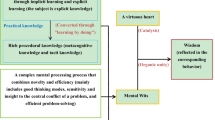Abstract
The thoughts that Michel Puech formulates on wisdom, technology and the art of living are timely at a moment when social, ecological and economic problems are pressing upon our societies and the speed of technological development seems to overwhelm our ability to integrate and adapt new technologies in our lives and societies. However, he restricts his concept of wisdom too much to a personal endeavor and overestimates the relevance of non-confrontation. I argue that his project can only be of value when it is embedded in a broader societal and political strategy for change.
Similar content being viewed by others
Notes
I am not a philosopher of technology. My comments on Michel Puech’s essay derive from my background and experiences as an economist and political scientist who for more than 20 years has been engaged with the question of sustainable development.
References
Crivits, M., Paredis, E., Boulanger, P.-M., Mutombo, E. J. K., Bauler, T., & Lefin, A.-L. (2010). Scenarios based on sustainability discourses: Constructing alternative consumption and consumer perspectives. Futures, 42, 1187–1199.
Easterlin, R. A., McVey, L. A., Switek, M., Sawangfa, O., & Zweig, J. S. (2010). The happiness-income paradox revisited. Proceedings of the National Academy of Sciences, 107(52), 22463–22468.
Goeminne, G., Sharon, T., Van Den Eede, Y., Dalgliesh, B., & Puech, M. (2014). Book symposium on homo sapiens technologicus: Philosophie de la Technologie Contemporaine, Philosophie de la Sagesse Contemporaine. Philosophy and Technology, 27(4), 581–608.
Jackson, T. (2009). Prosperity without growth. Economics for a Finite Planet. London/New York: Earthscan/Routledge.
Kallis, G. (2011). In defence of degrowth. Ecological Economics, 70, 873–880.
Martinez-Alier, J., Pascual, U., Vivien, F.-D., & Zaccai, E. (2010). Sustainable de-growth: Mapping the context, criticisms and future prospects of an emergent paradigm. Ecological Economics, 69, 1741–1747.
Paredis, E. (2011). Sustainability transitions and the nature of technology. Foundations of Science, 16(2–3), 195–225.
Patel, R. (2009). The value of nothing. How to reshape market society and redefine democracy. London: Portobello Books.
Puech, M. (2010). Sustainability means ethics and this is a cultural revolution. Paper for the RUC Sunrice Triple C conference, 20–22 April 2010, Roskilde, Denmark.
Puech, M. (2013). Why not post-political? Foundations of Science, 18(2), 351–353.
Puech, M. (2014). Beyond digital literacy: Technological wisdom for the good life. Paper for the CEPE conference 2014, 23–25 June, Paris, France.
Sachs, W. (1999). Planet dialectics. Explorations in environment and development. London/New York: Zed Books.
Shove, E. (2003). Comfort, cleanliness and convenience. The social organization of normality. Oxford/New York: Berg.
Author information
Authors and Affiliations
Corresponding author
Rights and permissions
About this article
Cite this article
Paredis, E. Which Wisdom Can Change the World?. Found Sci 22, 279–282 (2017). https://doi.org/10.1007/s10699-015-9453-8
Published:
Issue Date:
DOI: https://doi.org/10.1007/s10699-015-9453-8




